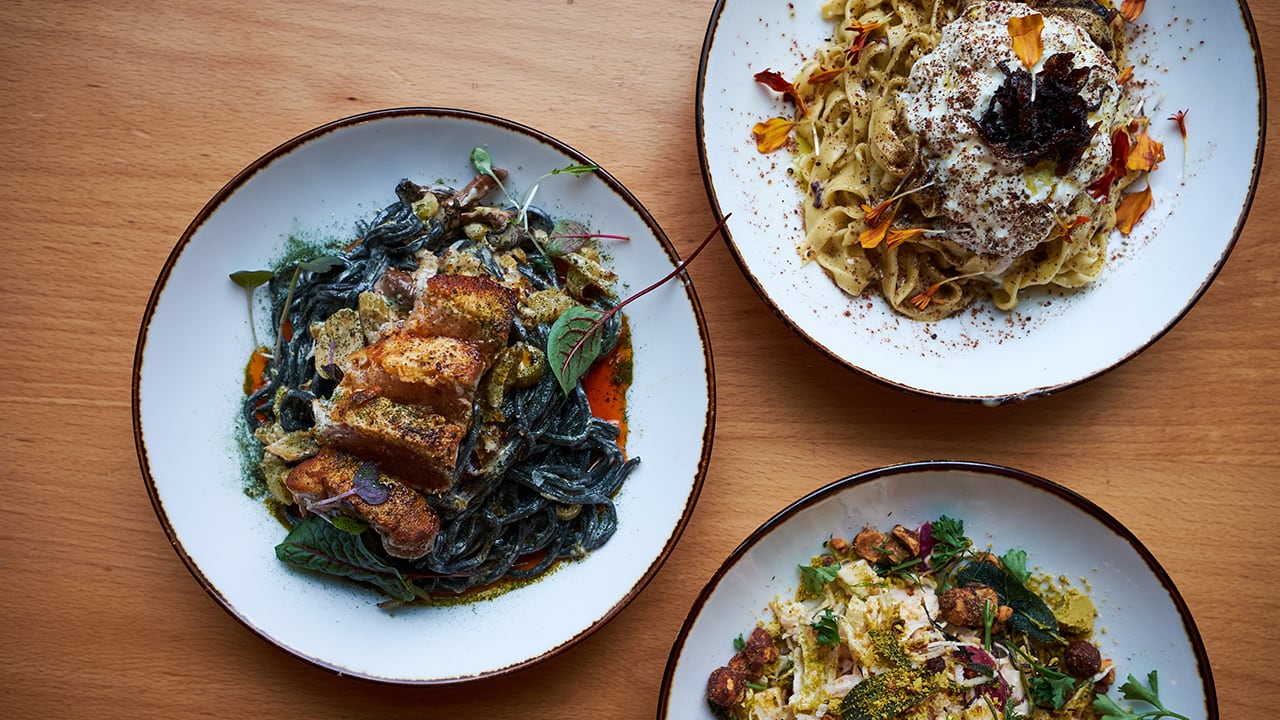As a food cart, Gumba punched above its weight, serving fresh pastas, handmade burrata and ambitious snacks that made you want to linger at an outdoor table. Now it's a brick-and-mortar in a time of takeout only—but you'll still want to break out the candles, placemats and cloth napkins once you get the food home: No meal in 2020 provided more of a "this feels like we are in a restaurant" frisson than Gumba's beet, cabbage and endive salad, pappardelle with braised beef sugo, pan-roasted steelhead trout, and eggplant olive oil cake.
Jesse Martinez and Robin Brassaw first opened Gumba in 2016, earning multiple Cart of the Year plaudits, and have made several location changes since then, all along Northeast Alberta. Now they're in the space that was once Aviary, mere blocks from its most recent cart spot, as well as the street's other high-profile new arrival, GrindWitTryz. Like its neighbor, Gumba got a big break on rent, making it possible to open without taking on the usual upfront costs.
"It's such a bummer to see so many places close right now," says Martinez, who paid his pasta dues at Bar Mingo in Nob Hill for eight-plus years. "But I think it's given a lot of opportunities to people that otherwise would not have received opportunities. It's cool to see so many people open up restaurants without having to go through investors or restaurant groups."
For now, the bigger space just means more room to prep and cook, as well as for storage and refrigeration. At the cart, Gumba might have gone through 10 pounds of beef a week for the pappardelle. Now it's more like 60. It's also upgraded its pasta-making tools, can roll out dough all over the empty dining room, and no longer has to use a ladder as a drying rack. The increased production also means it offers uncooked pasta, a pandemic add-on that simply wouldn't have been possible at the cart.
"And we have a dishwasher, which is so cool," Martinez says. "That's really what it all comes down to. We have a fucking dishwasher!"
Gumba still calls itself a "pasta parlor"—there's a sweet neon sign in the window of the new place—but its menu keeps expanding and changes every day. The tail-on steelhead trout ($20), stuffed with pecorino bread crumbs and sauced with bacon jam and pickled pepper puree, is something of a stalwart, as is the eggplant olive oil cake ($8). For that, Martinez turns the vegetable into a coffee-caramel glaze, an idea he had while making caponata. "It has a sweet smell when you're sautéeing it—it kind of reminded me of banana," he says. "So I wanted to figure out a way to utilize it in a dessert." Other recent offerings include St. Louis pork ribs ($22), chicken liver pâté with a miniature croissant and prunes ($10), and a crab cake with salsa verde and cucumber salad ($8).
Gumba is also famous for its Wednesday-only hot fried chicken sandwich and mostly Sunday pizza fritta—fried pizza dough wrapped around everything from chicken Parm to meatloaf with mac and cheese. The plan is to eventually have a late-night bar menu of "trashy elegance." The first cocktail to go was a tequila yuzu Jell-O shot.
But there are two things that are always on the Gumba menu. One is the tagliatelle ($17) with egg yolk, candied shallots, burrata, black pepper and sesame seed bread crumbs. The other is the pappardelle ($17). Here's the lowdown on the latter:

The Pappardelle
THE ORIGIN
Gumba's longest-standing dish came about by chance the second week the cart was open, when its meat purveyor offered up some short rib samples. "All right, what do we have around the cart that we can use to make pasta for tonight?" Martinez asked himself. It was featured in these pages just a few weeks later, and Gumba now goes through 60 pounds of beef a week and 50 to 80 orders a day.
THE NOODLE
All of Gumba's pastas use an egg dough comprising eggs, Caputo 00 flour, water, salt, and a "little bit" of both heavy cream and olive oil. Pappardelle, the widest of the flat, ribbon-style noodles, provides plenty of surface area for the sugo.
THE SUGO
With beef prices rising during the pandemic, the sugo is now made with chuck roast, which is no less tender. "And we actually put more beef in the dish," Martinez says. In addition to a long, slow braise, the meat gets some of its toothsomeness from lard—another change from the cart days, when smaller quantities allowed Martinez to use duck fat. Also on the plate: toasted red chile flakes, garlic, pecorino, tomato and toasted bread crumbs.
EAT: Gumba, 1733 NE Alberta St., 503-975-5951, gumba-pdx.com. 4:30-8 pm Wednesday, 4:30-8:30 pm Thursday-Monday.
